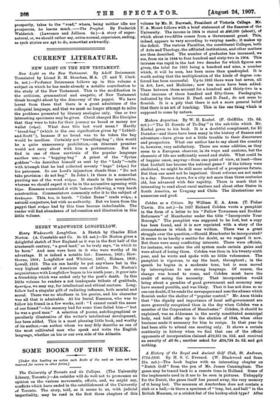CURRENT LITE RAT URE.
NEW LIGHT ON THE NEW TESTAMENT.
New Light on the New Testament. By Adolf Deissmann. Translated by Lionel R. M. Strachan, M.A. (T. and T. Clark. 3s. net.)—Professor Deissmann follows up in this volume a subject on which he has made already a notable contribution to the study of the New Testament. This is the modification in the criticism, grammatical and exegetic, of New Testament Greek brought about by the discovery of the papyri. We have learnt from these that there is a great admixture of the colloquial language, and that we must no longer attempt to solve the problems presented by literary analogies only. One or two interesting specimens may be given. Christ charged His Disciples that they were to take for their journey no bread or money nor wallet (,r1 pa). What does this last word mean ? Hardly " bread-bag " (which is the one signification given by " Liddell- and-Scott "), because if no bread was to be taken the bag would be needless. Certainly not "travelling-bag " ; this would be a quite unnecessary prohibition,—an itinerant preacher would not carry about with him a portmanteau. But we find in one of these survivals of the popular language another use,—a "begging-bag " A priest of the " Syrian goddess "—he describes himself as sent by the " Lady "—tolls with triumph that he had collected seventy "bags" (Tipai) for his patroness. So our Lord's injunction stands thus : " Do not take provision : do not beg." In John i. 14 there is a somewhat puzzling use of the word sri*ns. It stands in the nominative, whereas we should expect it to be in the accusative agreeing with a4ar. Erasmus connected it with 'liodyras following, a very harsh construction. Commentators commonly refer it to the subject of igsfircuaer. This, too, is harsh. "Codex Bezae" reads srXhon ; a natural conjecture, but with no authority. But we learn from the papyri that vMtpns had by this time become indeclinable. The reader will find abundance of information and illustration in this little volume.


































 Previous page
Previous page